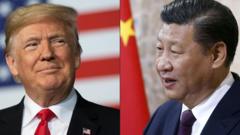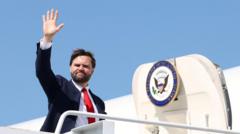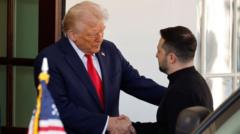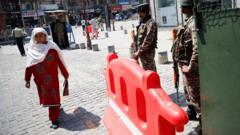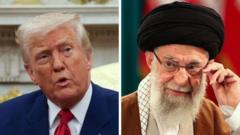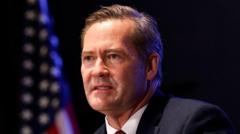The reshuffle in the Trump administration signals a new direction amidst ongoing controversies.
**Trump Replaces Waltz as National Security Adviser, Nominates Him for UN Role**
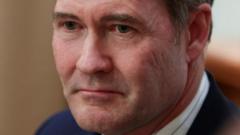
**Trump Replaces Waltz as National Security Adviser, Nominates Him for UN Role**
In a surprising move, Trump appoints Waltz as UN ambassador following security blunders.
In a notable shift within the Trump administration, President Donald Trump has announced the removal of Mike Waltz from his post as national security adviser, nominating him instead as the ambassador to the United Nations. This decision was shared through Trump's social media platform, where he expressed gratitude for Waltz's contributions and confirmed that Secretary of State Marco Rubio would temporarily fill the national security adviser role.
Waltz's departure stems from criticism surrounding an incident where he accidentally included a journalist in a group chat that discussed sensitive military actions, raising concerns about his ability to manage National Security Council staff. This faux pas is likely to be scrutinized during his confirmation process for the UN position.
In his statement on social media, Trump praised Waltz's commitment to national interests, stating, “I know he will do the same in his new role.” Meanwhile, Waltz expressed his gratitude for the opportunity to serve in a different capacity, acknowledging his ongoing commitment to the administration.
Reports indicate that the decision to nominate Waltz was made just hours before the public announcement, with Trump believing that Waltz could face difficulties securing Senate approval for his current position, thereby creating an opportunity for a seamless transition.
Waltz had faced intense scrutiny after an incident in March, where he mistakenly invited Jeffrey Goldberg, editor-in-chief of the Atlantic, to a Signal chat discussing confidential military strategies. The fallout from this situation has continued to unfold, leading to questions about his deputy, Alex Wong, who was also present in that chat group.
Meanwhile, the ambassador position to the UN remains vacant following Trump's earlier retraction of the nomination of Elise Stefanik, another Republican figure, due to internal party concerns. The situation drew light-hearted commentary from Minnesota Governor Tim Walz, who joked about Waltz's exit on social media.
In an interview, US Senator JD Vance indicated that Waltz's reassignment should not be viewed as a demotion but rather a promotion suited to his skills. Vance commended Waltz's ability to engage across party lines and expressed confidence in his suitability for the role.
Following this announcement, Rubio will take on a dual role, becoming the first official to hold both the roles of secretary of state and national security adviser since Henry Kissinger. There are also discussions about potential successors, with names such as Steve Witkoff and Ric Grenell being floated in political circles.
As this reshuffle unfolds, it calls to mind previous chaotic changes in Trump's national security team, raising questions about the stability and direction of US foreign policy under the current administration. Waltz's past remarks have highlighted his commitment to responsible governance, prompting observers to speculate on the implications of his new position at the United Nations.
Waltz's departure stems from criticism surrounding an incident where he accidentally included a journalist in a group chat that discussed sensitive military actions, raising concerns about his ability to manage National Security Council staff. This faux pas is likely to be scrutinized during his confirmation process for the UN position.
In his statement on social media, Trump praised Waltz's commitment to national interests, stating, “I know he will do the same in his new role.” Meanwhile, Waltz expressed his gratitude for the opportunity to serve in a different capacity, acknowledging his ongoing commitment to the administration.
Reports indicate that the decision to nominate Waltz was made just hours before the public announcement, with Trump believing that Waltz could face difficulties securing Senate approval for his current position, thereby creating an opportunity for a seamless transition.
Waltz had faced intense scrutiny after an incident in March, where he mistakenly invited Jeffrey Goldberg, editor-in-chief of the Atlantic, to a Signal chat discussing confidential military strategies. The fallout from this situation has continued to unfold, leading to questions about his deputy, Alex Wong, who was also present in that chat group.
Meanwhile, the ambassador position to the UN remains vacant following Trump's earlier retraction of the nomination of Elise Stefanik, another Republican figure, due to internal party concerns. The situation drew light-hearted commentary from Minnesota Governor Tim Walz, who joked about Waltz's exit on social media.
In an interview, US Senator JD Vance indicated that Waltz's reassignment should not be viewed as a demotion but rather a promotion suited to his skills. Vance commended Waltz's ability to engage across party lines and expressed confidence in his suitability for the role.
Following this announcement, Rubio will take on a dual role, becoming the first official to hold both the roles of secretary of state and national security adviser since Henry Kissinger. There are also discussions about potential successors, with names such as Steve Witkoff and Ric Grenell being floated in political circles.
As this reshuffle unfolds, it calls to mind previous chaotic changes in Trump's national security team, raising questions about the stability and direction of US foreign policy under the current administration. Waltz's past remarks have highlighted his commitment to responsible governance, prompting observers to speculate on the implications of his new position at the United Nations.







